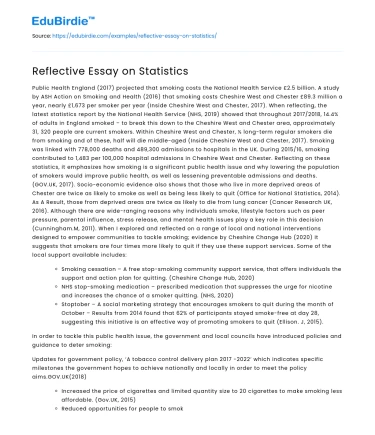Public Health England (2017) projected that smoking costs the National Health Service £2.5 billion. A study by ASH Action on Smoking and Health (2016) that smoking costs Cheshire West and Chester £89.3 million a year, nearly £1,673 per smoker per year (Inside Cheshire West and Chester, 2017). When reflecting, the latest statistics report by the National Health Service (NHS, 2019) showed that throughout 2017/2018, 14.4% of adults in England smoked – to break this down to the Cheshire West and Chester area, approximately 31, 320 people are current smokers. Within Cheshire West and Chester, ½ long-term regular smokers die from smoking and of these, half will die middle-aged (Inside Cheshire West and Chester, 2017). Smoking was linked with 778,000 deaths and 489,300 admissions to hospitals in the UK. During 2015/16, smoking contributed to 1,483 per 100,000 hospital admissions in Cheshire West and Chester. Reflecting on these statistics, it emphasizes how smoking is a significant public health issue and why lowering the population of smokers would improve public health, as well as lessening preventable admissions and deaths. (GOV.UK, 2017). Socio-economic evidence also shows that those who live in more deprived areas of Chester are twice as likely to smoke as well as being less likely to quit (Office for National Statistics, 2014). As A Result, those from deprived areas are twice as likely to die from lung cancer (Cancer Research UK, 2016). Although there are wide-ranging reasons why individuals smoke, lifestyle factors such as peer pressure, parental influence, stress release, and mental health issues play a key role in this decision (Cunningham.M, 2011). When I explored and reflected on a range of local and national interventions designed to empower communities to tackle smoking; evidence by Cheshire Change Hub (2020) It suggests that smokers are four times more likely to quit if they use these support services. Some of the local support available includes:
- Smoking cessation – A free stop-smoking community support service, that offers individuals the support and action plan for quitting. (Cheshire Change Hub, 2020)
- NHS stop-smoking medication – prescribed medication that suppresses the urge for nicotine and increases the chance of a smoker quitting. (NHS, 2020)
- Stoptober – A social marketing strategy that encourages smokers to quit during the month of October – Results from 2014 found that 62% of participants stayed smoke-free at day 28, suggesting this initiative is an effective way of promoting smokers to quit (Ellison. J, 2015).
In order to tackle this public health issue, the government and local councils have introduced policies and guidance to deter smoking:
Save your time!
We can take care of your essay
- Proper editing and formatting
- Free revision, title page, and bibliography
- Flexible prices and money-back guarantee
Updates for government policy, ‘A tobacco control delivery plan 2017 -2022’ which indicates specific milestones the government hopes to achieve nationally and locally in order to meet the policy aims.GOV.UK(2018)
- Increased the price of cigarettes and limited quantity size to 20 cigarettes to make smoking less affordable. (Gov.UK, 2015)
- Reduced opportunities for people to smoke. For example, limited opportunities to smoke in public places and banned smoking with children in the car. (Gov.UK, 2015)
- Cheshire West and Chester Council have introduced smoke-free hospitals including Chester’s Local hospital - The Countess of Chester. Leighton Hospital and Cheshire and Wirral Partnership have also introduced a smoke-free hospital. (Inside Cheshire West and Chester, 2017).
There is now extensive free support available to everyone in Chester and the UK, regardless of social status or geographic location. It is vital for the government, councils, and society to work together to discourage new smokers and help those currently smoking to stop, in order to create a healthier lifestyle for all.
A key Public Health England aim is to achieve a smoking-free generation by 2025 (Gov. uk, 2018). To reach this goal, the government must continue to develop new ways of supporting individuals to quit smoking – and prevent new smokers from starting. This will help to manage and improve the long-term detrimental impact on health, well-being, and lifestyles and reduce smoker-related illnesses.
To reach these targets, the government will continue to review the sanctions for retailers selling tobacco illegally, in order to prevent tobacco sales to underaged individuals. The Government has provided training to health professionals (Making Every Contact Count [MECC]), to help them provide support and information about smoking cessation during routine contact with smokers. (Craig & Senior, 2018), (Gov. uk, 2017). Upon reflection, It shows how essential for Cheshire West and Chester Council to understand what works well locally in order to target smoking cessation, promote healthier lifestyles within the community, and tackle some of the inequalities within society. (Gov. uk, 2017). Aiming for a smoking-free generation will encourage individuals to adopt healthier lifestyle choices, which will, in turn, lower the likelihood of illness or admission into the hospital. This would save the NHS a significant amount of money and allow resources currently allocated to deal with smoking-related illnesses to be redirected to other priority health areas. Continuing to encourage smoking cessation and actively discourage new smokers can have a significant impact on the future of public health within Chester and the UK.






 Stuck on your essay?
Stuck on your essay?

